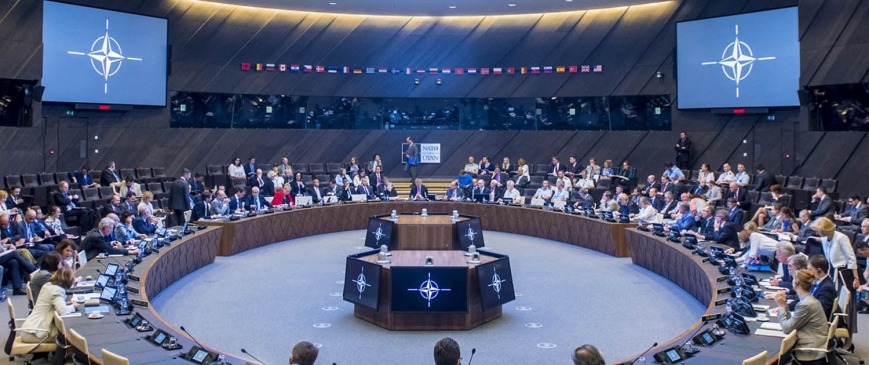
Nato at 70: Not 'brain dead', but needs shot in arm
What a difference a decade makes. Nato's 60th birthday celebration in 2009 was a show of confidence, sprinkled with the stardust of Barack Obama's first official visit to Europe and culminating in a 62-paragraph declaration covering everything from the Arctic to Africa.
France announced its full reintegration into Nato's integrated military command structure, and Albania and Croatia officially joined the alliance.
By contrast, the 70th anniversary finds the alliance looking doddery and unsure.
Allies are bracing for president Donald Trump, facing impeachment proceedings at home, to try to distract attention from his domestic troubles by berating allies – Germany especially – for their inadequate defence spending.
In the interests of damage limitation, when Nato heads of state and government meet in London on 3-4 December, each country will have just a few minutes to speak, followed by the publication of a short communique and various documents, including Nato's first military strategy since the 1960s.
There is a significant risk that Nato will be weaker and more divided after the London meeting than it was before. What was supposed to be a low-key celebration of the alliance's 70th anniversary is taking place against a background of multiple crises, internal and external, and public disagreements among allies.
But Nato's members still need to work together in the interests of their own security; and they have no better framework in which to do it. If leaders want to do something useful in London, they should focus on increasing Nato's role as a forum to talk about broad security problems.
'Currently dysfunctional'
Relations between allies are currently dysfunctional.
France's President Emmanuel Macron told the Economist we are experiencing the "brain death of NATO".
That comment followed Trump's decision to withdraw troops from northern Syria without any consultation with his allies, and Turkey's subsequent attack on the Kurdish forces in the area.
Turkey has also irked its Nato allies by buying the Russian S-400 air defence missile system, which prompted the US to eject it from its F-35 fighter jet programme.
Macron's support for increased European strategic autonomy has vexed the US, which sees it as an attempt to freeze American defence businesses out of EU defence projects.
And Macron's freelancing efforts to bring Russia in from the cold have annoyed the Germans and central Europeans.
Meanwhile, the British hosts are deeply distracted by Brexit and an unpredictable election on 12 December.
In reality, Trump, Macron and Recep Tayyip Erdoğan all have some valid criticisms of Nato, but poor ideas on how to do better. The correct course, however, is to look for better solutions, not to ignore the problems.
Trump is right that Europeans are not spending enough on defence. But the US should stay engaged in European security or risk playing into the hands of rivals – like China or Russia – that would like to see wider splits between the US and its traditional partners.
European defence spending has risen since Russia's annexation of Crimea – the US should encourage that process further. Information sharing and communication is another area that needs improvement, especially by the US.
Trump put allies' backs up when he announced without warning, let alone consultation, that the US would be withdrawing from the Intermediate-Range Nuclear Forces Treaty.
But since then, better information sharing with Nato has helped allies counter the Russian narrative on this issue.
China, Turkey, Russia...North Macedonia
It is also right that Nato takes an in-depth look at China, with member-states that have insights into its growing military and soft power capabilities helping others to assess the implications of accepting Chinese investment in their domestic infrastructure, be it 5G networks or ports like Piraeus in Greece and Antwerp in Belgium.
Erdoğan is right to think that Turkey's allies sometimes take it for granted, and that US and allied interventions in Iraq and Syria may have made the situations there worse.
But pivoting to Russia is not a long-term solution. Nato allies must also play a long game and recognise Turkey's strategic importance. The alliance is one forum where Western countries talk to Turkey, not just about it; they should make use of the opportunity.
Perhaps Macron should not have asked out loud whether Nato allies would honour their 'all-for-one and one-for all' Article 5 defence guarantee, if Turkey was attacked following its incursion into Syria. But the answer should be more Nato co-ordination, not Europe ignoring its partner's security problems.
Macron is also right to want Europeans to do more for their own security.
But he is misguided if he thinks that Europeans can develop the capabilities to defend themselves entirely without US assistance, or outside a Nato framework, in the foreseeable future. He should focus on getting the EU and Nato to use their complementary strengths to respond to emerging threats and disruptive technologies.
Despite having 29 members (soon to be 30, when North Macedonia's accession is ratified) on both sides of the Atlantic, Nato has often been neglected as a forum for political consultation.
EU member states have increasingly focused their discussions in the EU; the US has acted unilaterally or preferred to work with small groups.
But the security environment for all the allies demands broader, not narrower, consultation, and more co-operation between the EU and Nato, and between allies within Nato. If the London leaders' meeting turns out to be a 'frank exchange of views', in diplomatic speak, at least it should show that the alliance is far from brain dead.
Ian Bond is director of foreign affairs at the Centre for European Reform.
